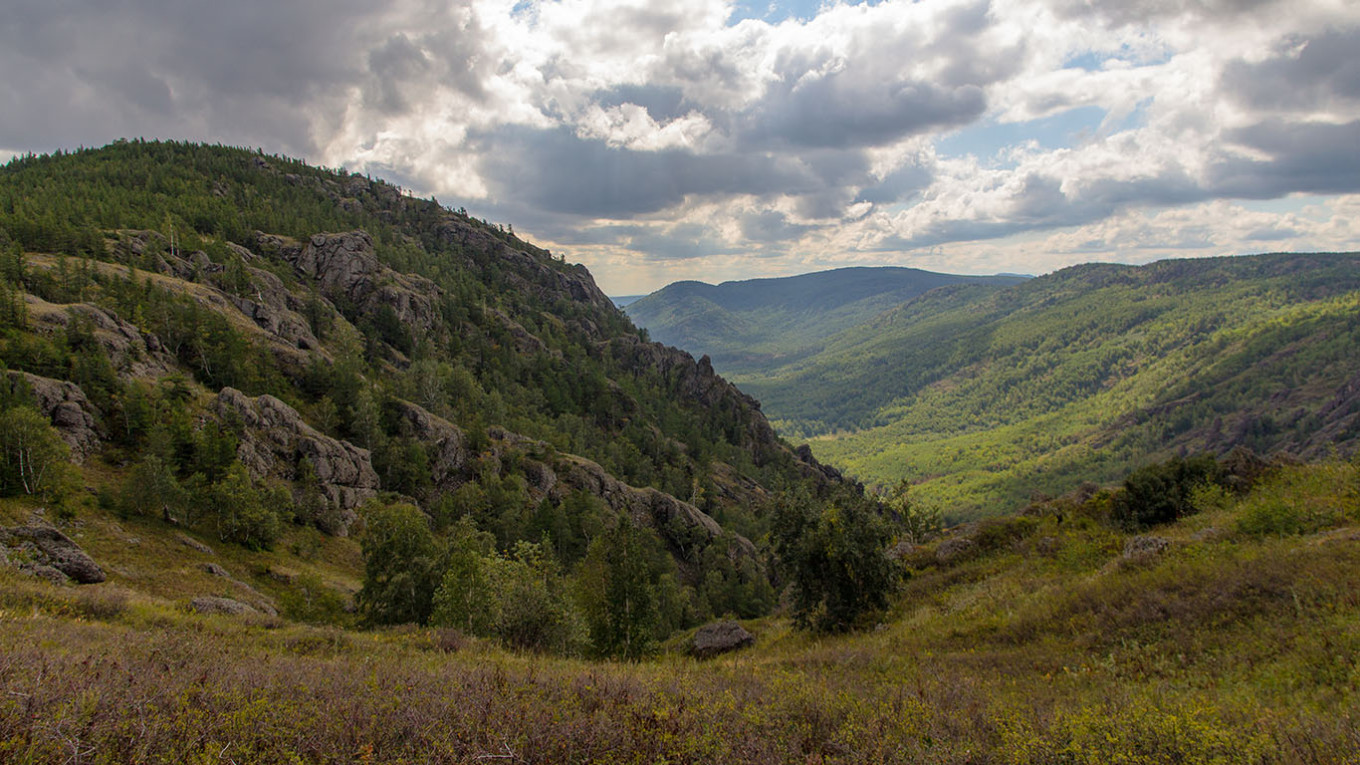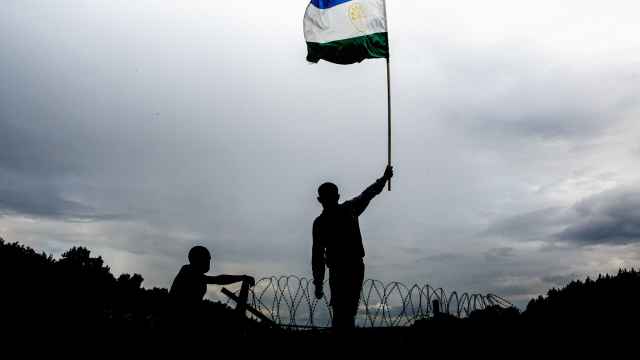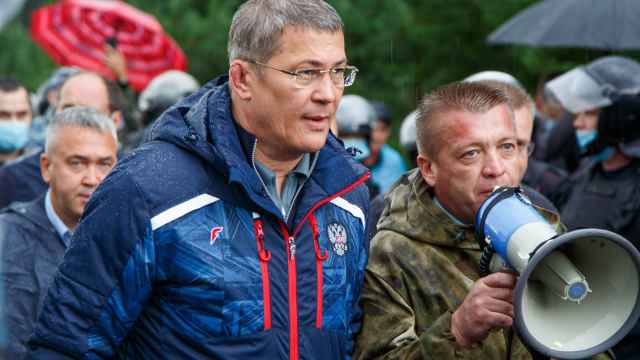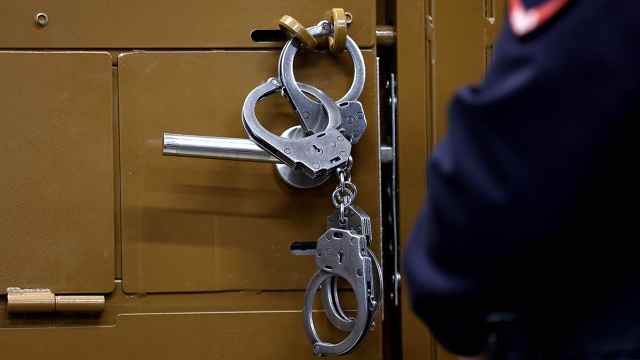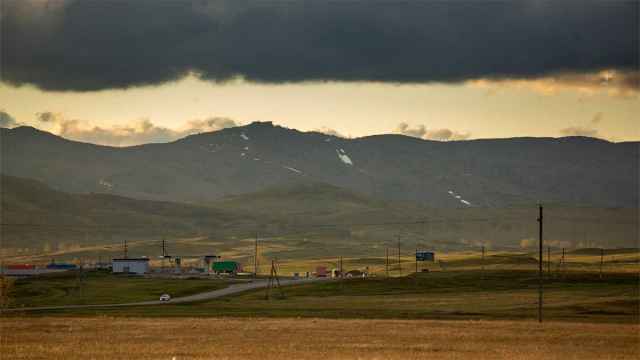“Whether perfect [in meeting ecological standards] or not…we simply don’t need…a mine. We need nature, we need health,” a woman from the village of Burangulovo said.
This was said at a public meeting with representatives of a firm linked to Russia’s third-largest copper producer regarding plans to mine copper at Kyrktytau, a pristine mountain range in the republic of Bashkortostan.
But no amount of resistance from locals would likely have stopped the Russian Copper Company (RCC) from launching geological exploration activities there this month.
With a number of natural monuments along its slopes, including Yaktykul, the republic’s deepest lake, the 60-kilometer-long Kyrktytau range is one of the most popular spots for outdoor tourism in Bashkortostan.
Environmental activists and residents argue that copper extraction at Kyrktytau would inflict irreversible harm to its picturesque environs — with the effects of the resulting water pollution felt as far away as western Kazakhstan.
“I am amazed by the beauty of the republic of Bashkortostan, but I am even more amazed by the amount of natural resources [available here],” said Murad Shafikov, a member of the government-sanctioned team monitoring the exploration activities.
“[These resources] should work to benefit our government. We really need them right now,” he added in an interview filmed at the future mining site and published by local independent news outlet Aspekty.
Unpredictable resistance
Bashkortostan, a resource-rich republic in Russia’s Volga-Ural region, is already reeling from the largest protests of wartime Russia and the repressions that followed them, which have become the largest political trial in modern Russian history.
Over 80 people were arrested and nearly 500 were charged with administrative offenses after at least 5,000 gathered in the small town of Baymak to protest the imprisonment of prominent Indigenous rights and environmental activist Fayil Alsynov in January 2024.
Two men arrested in connection to the protests died while under investigation.
Though RCC was forced to abort its initial plans for copper mining at Kyrktytau in 2020 under pressure from large-scale protests, few expected any resistance to its plans in the aftermath of the Baymak events.
"The authorities’ actions were completely predictable. But what was unpredictable is that people would resist, that they would [dare] speak up against the mining even during town hall meetings,” said Iliuza Mukhamedianova, a social researcher from Bashkortostan.
"I honestly thought that, after the Baymak protests, any remaining resistance had been rooted out," Mukhamedianova told The Moscow Times.
Shortly after local RCC subsidiary Salavatskoe confirmed in April that it had obtained an exploration and mineral production license at Kyrktytau, residents of Bashkortostan’s Abzelilovsky district created Telegram and VKontakte groups to facilitate information exchange about the project and coordinate protest efforts.
Denied official permission to stage a rally, ordinary residents and environmental activists focused on online campaigning and town hall meetings with Salavatskoe representatives.
Locals’ impassioned speeches in defense of the mountain range were captured on video and soon went viral.
“I understand that this meeting is a formality. I know that all those who came here and spoke out will be harassed [by the authorities],” a local woman said at a town hall in April, speaking in the Indigenous Bashkir language.
“I just have one question: are you so thirsty for money that this land is the thing you need? Are you not scared of being cursed by the people you are planning to harm?” she continued, drawing a round of applause.
Her words turned out to be prophetic. On June 5, security forces raided homes and detained at least 15 activists campaigning against mining at Kyrktytau.
Though most of the detainees were later set free without charges, the prominent Bashkir activist and blogger Ural Baybulatov was released on bail pending trial on charges of spreading "knowingly false information,” an offense punishable by up to three years in prison.
Since the searches, the campaign coordination chats have largely died down.
Global ties
“We have met with the company’s management and discussed the situation many times,” Bashkortostan’s head Radiy Khabirov said at a government meeting on July 7 after confirming that geological exploration at Kyrktytau was in full swing.
“It is a large enterprise and the company vowed to build it in the same way as the Tominsky Mining and Processing Plant — of a very high quality and quite environmentally friendly,” Khabirov added.
Located in the neighboring Chelyabinsk region, one of the most polluted in the country, the RCC-owned Tominsky plant was opened in 2020 despite a seven-year campaign waged by environmental activists who warned of severe air and water pollution from open-pit mining.
The plant is one of the RCC’s 11 mining and metallurgical enterprises in Russia and Kazakhstan, making it one of the largest copper producers in Russia.
Russia has the world’s fourth-largest amount of copper reserves at 80 million metric tons. The RCC is the country’s largest single owner of copper reserves, with a share amounting to 16 million tons as of 2022.
Unlike the U.S. and Britain, the European Union stopped short of imposing a blanket ban on Russian copper imports as part of its sanctions over Russia’s invasion of Ukraine.
And though Russian metals sales in the EU declined since the start of the war, European firms have not stopped their dealings with Kremlin-linked enterprises altogether. In 2023, Russia accounted for 9% of all the copper imported by EU member states.
Unlike its founder Igor Altushkin, who is rumored to be a principal financial backer of a volunteer battalion fighting for Russia in Ukraine, the RCC itself is not sanctioned by the EU.
The Moscow Times sent a request to RCC to confirm whether the company exports its products to the European Union. It did not receive a response by the time of publication.
‘Harmful by nature’
During its five years of operation, the Tominsky plant referenced by Bashkortostan’s head Khabirov occasionally surfaced in the media thanks to publicity trips for journalists organized by the RCC.
The most recent trip in April was tailored for journalists from Bashkortostan — part of a government-backed campaign aimed at swaying local public opinion.
Most publications resulting from these organized tours highlight the plant’s stringent emission control measures, including praise for being the only copper mining and processing plant in the post-Soviet space operating without a facility for storing tailings, the waste rock that remains after the valuable copper has been extracted from the ore material.
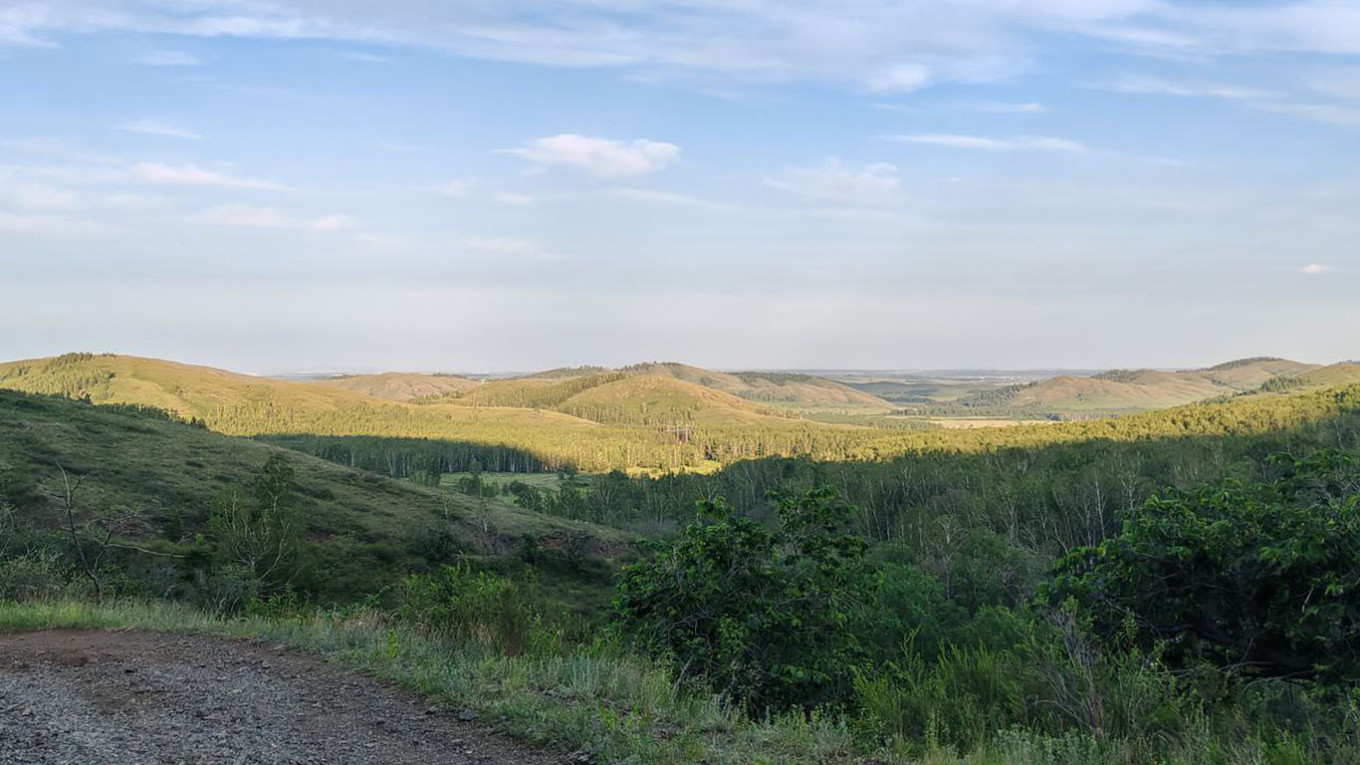
“The assertion that the Tominsky plant ‘solves’ certain environmental issues by operating without a tailings dam is misleading,” said environmental engineer Viliuia Choinova.
“The backfilling of [the residual crushed rock and water mixture at] the Korkinsky pit does not eliminate ecological harm but merely redistributes waste, potentially endangering other ecosystems and water sources,” Choinova told The Moscow Times, referring to the pit used at the Tominsky plant.
While journalists reporting from the Tominsky plant highlight the mining site’s visible cleanliness and fresh air, Choinova cautioned against mistaking these surface-level impressions for indicators of ecological safety.
“Air pollution may not always be visible as ‘smoke,’ but fine particulate matter and chemical pollutants can still pose severe threats to human and environmental health due to their ability to accumulate in the lungs and bloodstream over time,” explained Choinova.
Equally invisible to the naked eye is “contamination of groundwater and soil with heavy metals, acid mine drainage that can persist for decades and destruction of habitats critical to biodiversity,” she said.
“All mining is harmful by nature. It involves large-scale disruption of natural systems and leaves long-lasting scars on landscapes and ecosystems. There is no such thing as ‘clean’ or ‘green’ mining,” the expert warned.
“Responsible mining should begin with the acknowledgment that harm cannot be fully avoided, and must include honest risk assessments, strict environmental safeguards and meaningful public engagement at every stage,” she added.
If the geological exploration at Kyrktytau confirms the availability of adequate copper deposits, RCC plans to start mining at the site as early as 2027. By 2029, the company aims to complete construction of the processing plant and put it into operation, according to the head of its Bashkortostan subsidiary.
But while it might appear that resistance to RCC has been stamped out, the company’s journey to Kyrktytau’s metals might not be as easy as expected.
“Land is vitally important to Bashkirs — both in terms of its spiritual, almost sacred value, and in terms of livelihood,” said Bashkir researcher Mukhamedianova.
“So I think we will see more protests,” she said. “Maybe they will be small, maybe they will happen through social media, but it's hard to believe that the locals will just sit back and do nothing.”
A Message from The Moscow Times:
Dear readers,
We are facing unprecedented challenges. Russia's Prosecutor General's Office has designated The Moscow Times as an "undesirable" organization, criminalizing our work and putting our staff at risk of prosecution. This follows our earlier unjust labeling as a "foreign agent."
These actions are direct attempts to silence independent journalism in Russia. The authorities claim our work "discredits the decisions of the Russian leadership." We see things differently: we strive to provide accurate, unbiased reporting on Russia.
We, the journalists of The Moscow Times, refuse to be silenced. But to continue our work, we need your help.
Your support, no matter how small, makes a world of difference. If you can, please support us monthly starting from just $2. It's quick to set up, and every contribution makes a significant impact.
By supporting The Moscow Times, you're defending open, independent journalism in the face of repression. Thank you for standing with us.
Remind me later.



